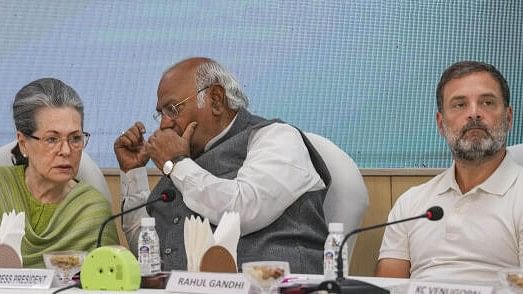
Congress President Mallikarjun Kharge with party leaders Sonia Gandhi and Rahul Gandhi during the CWC meeting’ at AICC headquarters, in New Delhi.
Credit: PTI Photo
In the midst of relief that the Bharatiya Janata Party (BJP) failed to get a majority in the Lok Sabha, it is all too easy to forget that it won on its own more seats than the Indian National Developmental Inclusive Alliance (I.N.D.I.A.). The Opposition may have exceeded all expectations, but it has some way to go in dismantling authoritarian rule.
After its creditable show, the Congress must lead the way in consolidating Opposition gains. But first, it must acknowledge that its tally of 99 seats is still its third poorest showing; it must improve.
The first task in hand is to complete expeditiously its organisational revamp at the central level. Firstly, it should trim the Congress Working Committee (CWC), which now has 36 members, 18 permanent invitees and seven special invitees, apart from Mallikarjun Kharge, the party president.
The CWC is the highest executive organ of the party, tasked to deliberate and frame the policies of the party, and endorse or take all important decisions. It should be a leaner body to be efficient, even given the need to balance various interests. The Congress constitution says that the CWC shall consist of the Congress president, former presidents, the chairperson of the Congress Parliamentary Party, Congress prime ministers, the leaders of Congress in the Lok Sabha and Rajya Sabha, and 35 other members of whom 18 will be elected by the AICC and the rest appointed by the President. That’s big enough. Invitees can be accommodated in the nominated category and, in accordance with the stipulation, 18 members must be elected by the All India Congress Committee (AICC) to promote inner party democracy and make the party more dynamic.
The Congress Parliamentary Board (CPB) has historically been a crucial cog in the machine. Article XXV of the party constitution says the CWC shall set up a CPB comprising the Congress president, prime minister (when applicable), the chairperson of the Congress Parliamentary Party and five other members. It doesn’t exist now, so it should be set up.
Then it should turn to cleaning its stables in the states. It can begin by classifying states into those where the Congress is still functional, and where it is the main party fighting the Bharatiya Janata Party (BJP) or its allies and those in which it has a secondary role. Madhya Pradesh, Chhattisgarh, Rajasthan, Haryana, Himachal Pradesh, and Uttarakhand in the north are states where the Congress has a primary role. Priorities can be set throughout the country.
For northern India, the Congress has almost five years before the Assembly elections happen in Madhya Pradesh, Chhattisgarh, and Rajasthan. It can start rebuilding its party organisation from below taking into account the results of both the Assembly and general elections. Deadwood must be ruthlessly jettisoned as must be agents provocateurs.
Take the case of Madhya Pradesh. It won an Assembly election there in 2018, though it was cynically unseated by the BJP. In 2019, it was wiped out in the general elections. In 2023, it was expected to either win the Assembly elections or, at least, perform creditably. It was hammered, as it was again in the just-concluded general elections. Too much is made of Madhya Pradesh being the original laboratory of Hindutva’s divisive and fascistic politics. It’s not as if it cannot be won by liberal, secular forces. Let’s look at the record. The BJP won the state in 1990; the Congress in 1993 and 1998; the BJP in 2003, 2008, and 2013; the Congress again in 2018; and the BJP in 2023. In general elections, the Congress has performed badly since 1996, with 2009 as the exception.
Madhya Pradesh is not some kind of unconquerable BJP fortress, unlike Gujarat. The problem is the Congress does not have a robust organisation and what exists is riven by factionalism, and disloyalty. Jaded and cynical leaders command very little respect or loyalty because they themselves have none. A new, younger leadership must be promoted with the backing of the central leadership and funds.
Elsewhere, too, as in Maharashtra, Gujarat, and Chhattisgarh, factionalism is endemic. To stamp it out, party discipline must be ruthlessly enforced. As in better times, a disciplinary mechanism must be created in the form of dedicated committees at every level, to make for fairness. The general committees should not discharge this function.
The Congress has a history of procrastination when it comes to important calls. Once the Leader of the Opposition issue has been resolved, it must get to work with alacrity, buoyed by the new possibilities that have opened.
(Suhit K Sen is author of The Paradox of Populism: The Indira Gandhi Years, 1966-1977.)
Disclaimer: The views expressed above are the author's own. They do not necessarily reflect the views of DH.